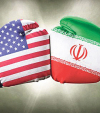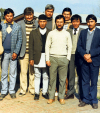
OR
Act to save wildlife
Published On: January 25, 2020 09:55 AM NPT By: Tarush More
Nepal has a lot of majestic forests. They are all home to hundreds of animals, birds and plants. We have Chitwan National Park, Bardiya National Park and even some forested areas around Mustang. These forests and jungles are even home to extremely rare animals like the snow leopard and greater one-horned rhinoceros, which are found in parts of Russia, Afghanistan, India, Nepal, Bhutan, China, Tajikistan, Kazakhstan, Uzbekistan, Pakistan and Kyrgyzstan.
Teaching with rubrics
Published On: January 25, 2020 09:48 AM NPT By: Rishi Ram Paudyal
Use of rubrics is growing day by day due to its effectiveness in teaching. But most teachers in Nepal, I presume, have little idea about it. I wish to share some information about designing and implementing rubrics while teaching, not as an expert, but as a learner-teacher.
Ownership Concentration
Published On: January 25, 2020 09:22 AM NPT By: Alissa Amico
DUBAI – If the global economy were a chess game, few pieces would be left on the board. Most would be relegated to the role of bystanders, observing a concentration of power in the hands of an ever-dwindling number of global players. Now let us imagine that the pieces left standing are corporate entities, with a shrinking number of ultimate owners at the helm. This analogy fundamentally characterizes the global economy today.
China’s spring festival
Published On: January 25, 2020 09:01 AM NPT By: Harish Chandra Shah
Nepal and China have a lot in common in terms of culture and celebrations. Like Nepal, various traditional festivals are celebrated in China. Spring festival, also New Year, is the biggest celebration in China. Each year when winter is at its end and spring around the corner, people throughout China and those living outside China enthusiastically celebrate the first important traditional holiday of the year. Chinese celebrate spring festival as a New Year by the lunar calendar. Today (January 25) is their New Year. According to Chinese lunar calendar, there are 12 animals—mouse, ox, tiger, rabbit, dragon, snake, horse, sheep, monkey, rooster, dog, pig—to symbolize the year in which a person is born. This year is rat year.
Trump’s Backward March on Trade
Published On: January 23, 2020 08:33 AM NPT By: Anne O Krueger
WASHINGTON, DC – Following America’s disastrous 1930 Smoot-Hawley Tariff Act, the subsequent international trade war, and eventually World War II, the United States went on to lead the world toward a more open multilateral trading system. In 1947, the international community adopted the General Agreement on Tariffs and Trade, which would later become the World Trade Organization. Under this international body, trade was bound to the rule of law and the principle of non-discrimination among trading partners.
Let us grow yams
Published On: January 23, 2020 08:23 AM NPT By: Bhairab Raj Kaini
Nepalis celebrate Maghe Sakranti (first day of Magh) by consuming different tuber crops mainly yam and sweet potato. They did so this year too. Normally, people boil the yams in the evening of the last day of Poush and relish them the next morning with ghee and chaku. Generally, sesame seed Laddus, molasses, ghee, sweet potatoes and yam are included in the menu. It is widely believed that the boiled yams taken on the morning of Maghe Sakranti staves off cold-related ailments. People in Kathmandu also celebrate this festival with delicacies made from yam, ghee and chaku. That is why mountains of yams are seen in Kalimati and Balkhu wholesale markets every year during Maghe Sakranti. It has also a cultural and religious importance in Nepali society.
Costs of conflict
Published On: January 23, 2020 08:19 AM NPT By: Biranchi Poudyal
The United States told the United Nations that the killing of Iranian commander Qasem Soleimani was in self-defence and vowed to take additional action “as necessary” in the Middle East to protect US personnel and interests. On other side, Iran retaliated by firing 20 ballistic missiles at two military bases in Iraq where United States troops were stationed. It is believed that driving out the presence of United States from the region was the major objective of Iran and Soleimani’s personal mission. So the bigger picture is Iran lost its best military strategist and the assassination ensured the elimination of a man who America saw as potential challenger of its primacy in region.
Revitalizing sociology and anthropology
Published On: January 22, 2020 09:57 AM NPT By: Gaurab KC
Visual images are powerful mediums in understanding people and the society. They help us memorialize the events of the past from the present. Last Friday (January 17), I was in North Bengal University, Siliguri, to attend International Seminar on State-Society Relationship in the Himalayas—organized by Centre for Himalayan Studies. There I presented a paper on the trajectory of anthropologist Dor Bahadur Bista and his seminal work People of Nepal, published in 1967. Along with my presentation, I had planned to display some of the photographs of Bista. Unfortunately, I couldn’t do so due to a technical hitch that occurred during my presentation.
Lessons from Southeast Asia
Published On: January 22, 2020 09:51 AM NPT By: Sourav Dhungana
For many decades, South East Asian countries went under-noticed. No more so. The politically and socio-economically turbulent region of the past attracted 11.5 percent of global FDI inflows worth around USD155 billion in 2018. The major reason for this economic impetus resides in their commitment for regionalism, enhanced connectivity to foster intra and inter-regional trade and innovation policies that stimulate socio-economic development. For Nepal, this achievement can provide valuable lessons in terms of policy measures and robust implementation mechanism to overcome ‘rent-seeking mentality’. Lessons from ASEAN economies are quintessential on grounds of our similar political, economic and cultural experiences and geo-proximity.
Financial Markets’ Iran Delusion
Published On: January 22, 2020 09:48 AM NPT By: Nouriel Roubini
LONDON – Following the United States’ assassination of Iranian Quds Force commander Qassem Suleimani and Iran’s initial retaliation against two Iraqi bases housing US troops, financial markets moved into risk-off mode: oil prices spiked by 10 percent, US and global equities dropped by a few percentage points, and safe-haven bond yields fell. In short order, though, despite the continuing risks of a US-Iran conflict and the implications that it would have for markets, the view that both sides would eschew further escalation calmed investors and reversed these price movements, with equities even approaching new highs.



Just In
- One killed in tractor-hit
- Karnali Chief Minister Kandel to seek vote of confidence today
- Chain for Change organizes ‘Project Wings to Dreams’ orientation event for inclusive education
- Gold price decreases by Rs 200 per tola today
- National Development Council meeting underway
- Meeting of Industry, Commerce, Labor and Consumer Welfare Committee being held today
- Nepali announces cricket squad under captaincy of Rohit Paudel for series against West Indies 'A'
- Partly cloudy weather likely in hilly region, other parts of country to remain clear
























